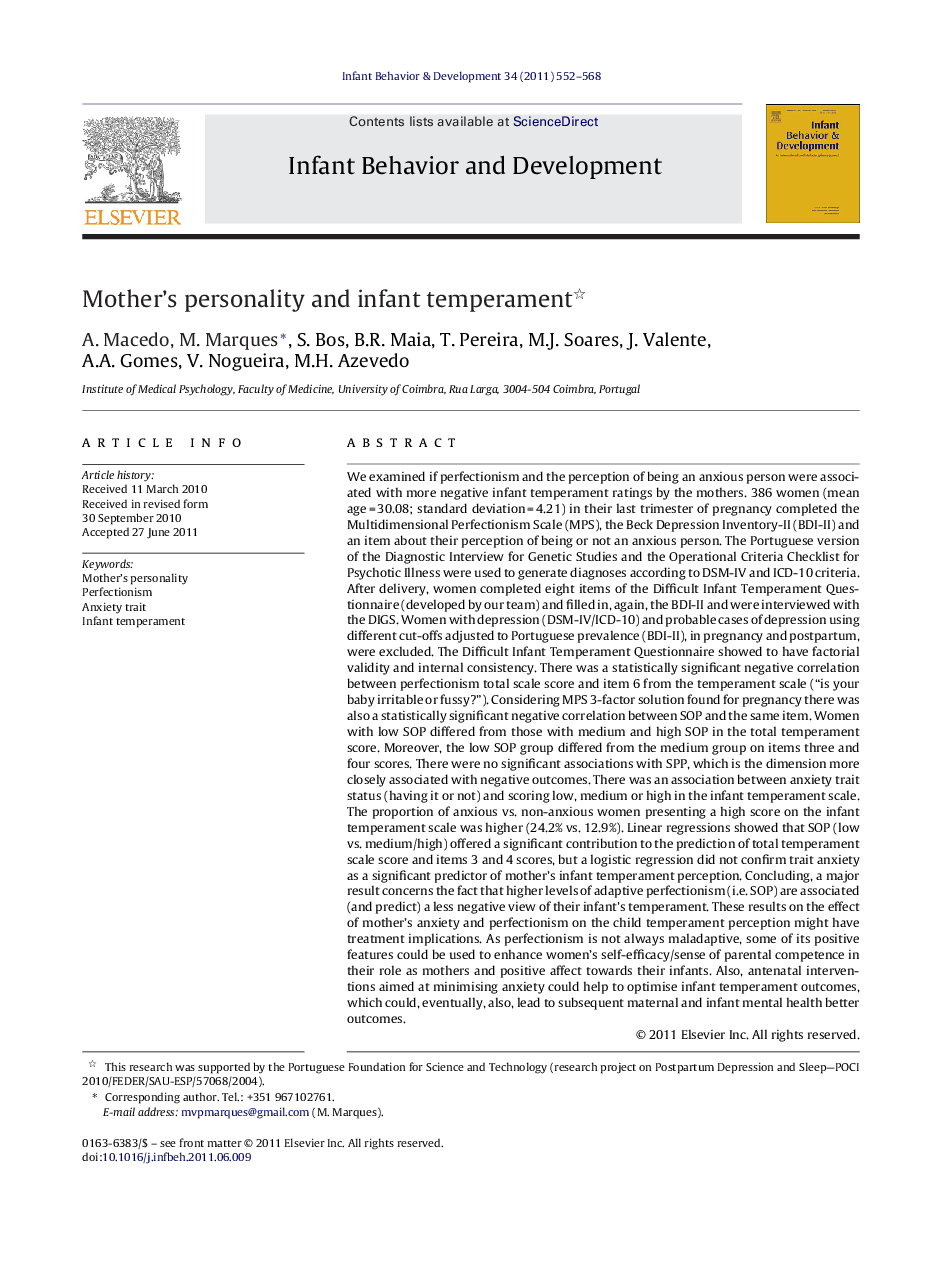| کد مقاله | کد نشریه | سال انتشار | مقاله انگلیسی | نسخه تمام متن |
|---|---|---|---|---|
| 917282 | 919259 | 2011 | 17 صفحه PDF | دانلود رایگان |

We examined if perfectionism and the perception of being an anxious person were associated with more negative infant temperament ratings by the mothers. 386 women (mean age = 30.08; standard deviation = 4.21) in their last trimester of pregnancy completed the Multidimensional Perfectionism Scale (MPS), the Beck Depression Inventory-II (BDI-II) and an item about their perception of being or not an anxious person. The Portuguese version of the Diagnostic Interview for Genetic Studies and the Operational Criteria Checklist for Psychotic Illness were used to generate diagnoses according to DSM-IV and ICD-10 criteria. After delivery, women completed eight items of the Difficult Infant Temperament Questionnaire (developed by our team) and filled in, again, the BDI-II and were interviewed with the DIGS. Women with depression (DSM-IV/ICD-10) and probable cases of depression using different cut-offs adjusted to Portuguese prevalence (BDI-II), in pregnancy and postpartum, were excluded. The Difficult Infant Temperament Questionnaire showed to have factorial validity and internal consistency. There was a statistically significant negative correlation between perfectionism total scale score and item 6 from the temperament scale (“is your baby irritable or fussy?”). Considering MPS 3-factor solution found for pregnancy there was also a statistically significant negative correlation between SOP and the same item. Women with low SOP differed from those with medium and high SOP in the total temperament score. Moreover, the low SOP group differed from the medium group on items three and four scores. There were no significant associations with SPP, which is the dimension more closely associated with negative outcomes. There was an association between anxiety trait status (having it or not) and scoring low, medium or high in the infant temperament scale. The proportion of anxious vs. non-anxious women presenting a high score on the infant temperament scale was higher (24.2% vs. 12.9%). Linear regressions showed that SOP (low vs. medium/high) offered a significant contribution to the prediction of total temperament scale score and items 3 and 4 scores, but a logistic regression did not confirm trait anxiety as a significant predictor of mother's infant temperament perception. Concluding, a major result concerns the fact that higher levels of adaptive perfectionism (i.e. SOP) are associated (and predict) a less negative view of their infant's temperament. These results on the effect of mother's anxiety and perfectionism on the child temperament perception might have treatment implications. As perfectionism is not always maladaptive, some of its positive features could be used to enhance women's self-efficacy/sense of parental competence in their role as mothers and positive affect towards their infants. Also, antenatal interventions aimed at minimising anxiety could help to optimise infant temperament outcomes, which could, eventually, also, lead to subsequent maternal and infant mental health better outcomes.
► We studied the link of two personality traits with mother's infant temperament rating.
► A new questionnaire was developed, Difficult Infant Temperament Questionnaire (DITQ).
► DITQ showed factorial validity and internal consistency.
► Self-oriented perfectionism predicted a less negative view of infant's temperament.
► Anxious women presented a high score on infant temperament than non-anxious women.
Journal: Infant Behavior and Development - Volume 34, Issue 4, December 2011, Pages 552–568